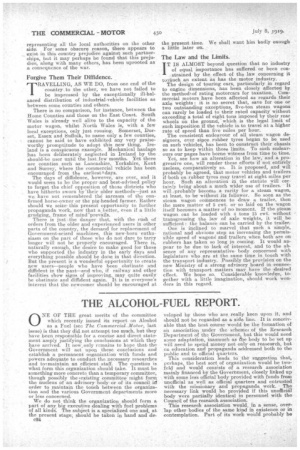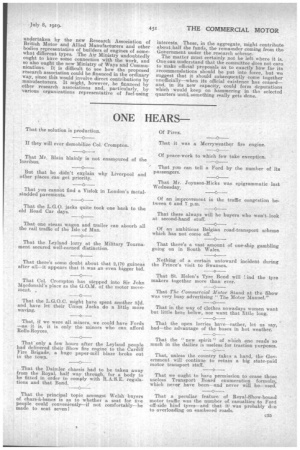THE ALCOHOL-FUEL REPORT.
Page 2

Page 3

If you've noticed an error in this article please click here to report it so we can fix it.
ONE OF THE great merits of the committee which recently issued its report on Alcohol as a Fuel (see The Commercia17fotor, last issue) is that they did not attempt too much, but they have been responsible for a concise and direct statement amply justifying the conclusions at which they have arrived. It now only remains to hope that the government will act upon these conclusions and establish a permanent organization with funds and powers adequate to conduct the necessary researches and tolonaintain an efficient staff. The question is what form this organization should take. It, must be something more concrete than a temporary committee, though possibly the iexisting committee might form, the nucleus of an advisory body or of its council id order to maintain the touch between the organization and the various Government departments more or less concerned. .
We do not think the organization should form a part of any big executive dealing with fuel problems of all kinde: The subject is a specialized one and, at the present stage, should be taken in hand and de e24 veloped by those who are really keen upon it, and should not be regarded as a side line. It is conceivable that the best course would be the formation of an association under the schemee of the Research Department of the Government, but this would need some adaptation, inasmuch as ie body to be set up will need to spend money not only on re.asearch, but on education and propaganda addressed both to the public and to official quarters.
This consideration leads to the suggestion that, perhaps, the best sort of organization would be twofold and would consists of a research association mainly financed by the Government, closely linked up with some less official body provided with funds from unofficial as well as official quarters and entrusted with the missionary and propaganda work. The necessary link would be provided it this unofficial body were partially identical in personnel with the Council of the research association.
This research association would, in a sense, overlap other bodies of the same kind in existence. or in contemplation. Part of its work would probably be undertaken by the new Research Association of British Motor and Allied Manufacturers and other bodies representative of builders of engines of somewhat different types. The Air Ministry undoubtedly ought to have some connection with the work, and so also ought the new Ministry of Ways and Communications. It is difficult to see how the proposed, research association could be financed in the ordinary way, since this would involve direct contributions by manufacturers. It might, however, be financed by other research associations and, particularly, by various organizations representative of fuel-using interests. These, in the aggregate, might contribute about half the funds, the remainder coming from the Government under the research scheme.
The matter must certainly not be left where it is. One can understand that the committee does not care to make official proposals as to exactly hew far its recommendations should be put into force, but we suggest that it should subsequently come together unofficially—when its official existence has ceased— and, in its new capacity, could form deputations which • would keep on hammering in the, selected quarters until something really gets done.






















